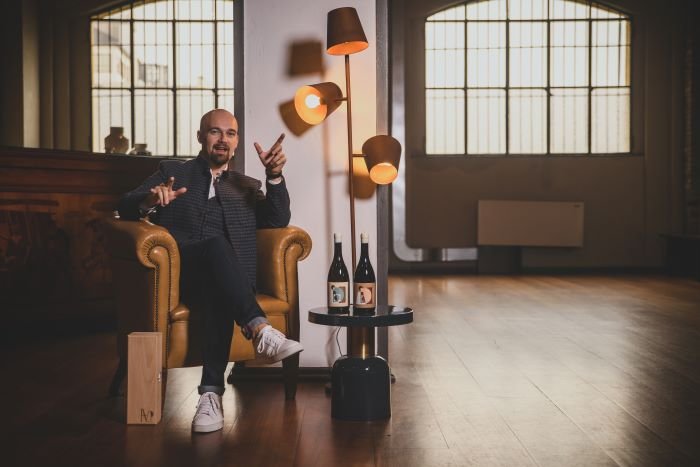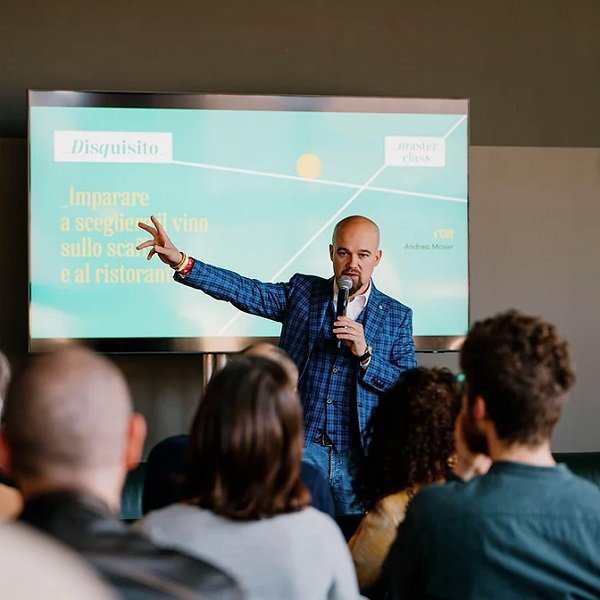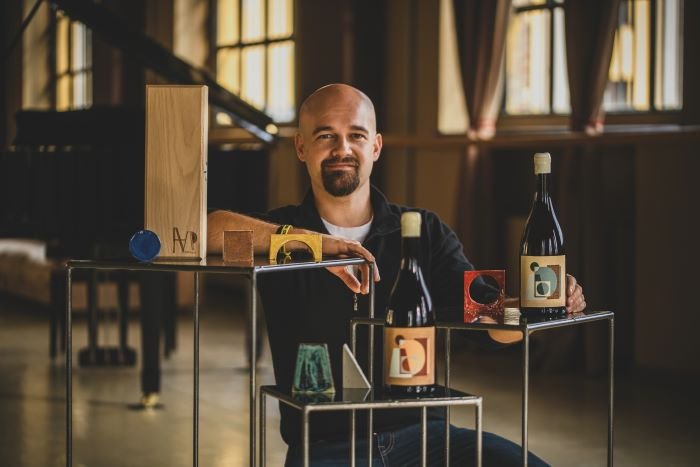Andrea Moser is a winemaker and manager, a strategic consultant who helps wine companies develop their identity in the market. We interviewed him to learn about his new projects.
Trentino-born, class of 1982. After working Nine years for Franz Haas and directed the winery in Kaltern, South Tyrol’s largest winemaking cooperative. Today Andrea Moser has decided to devote himself to the free activity as a consultant, in which he is involved with numerous Italian wineries. In the meantime, he has also started to produce his first solo Temporary wine, a wine project intended for the production of niche labels, of which the second vintages will be released in November.

Tireless and always in search of new trials (recall that in 2016 he distinguished himself for the feat, carried out with colleague Gerhard Sanin, of crossing Italy in tandem-more than 1,000 km-to promote Kalterersee wine, from Schiava grapes, a typical variety of the Doc Lago di Caldaro area). Recently, Andrea has embarked on a new adventure: to take up a professorship and become a wine lecturer with his AMProject training school.
Andrea let’s get straight to the point: the AMProject training school. What inspired you to create this program and what was the main goal you had in mind?
“I strongly believe in knowledge sharing. Insieme al mio team, ho voluto creare questo programma di corsi per raccontare la mia esperienza ma soprattutto per poter offrire soluzioni concrete a chi si approccia a questo lavoro e non solo. I miei corsi sono consigliati anche a sommelier o appassionati di vino ed enologia».
Training
The world of wine education, as you know, is saturated with offerings, from professional taster and sommelier courses to the more easy approach to wine. In what do you think your proposal could differentiate itself?
“All the courses that teach wine or its tasting today give you a method for tasting it or explain how wine should be made. I would like to give people the tools and knowledge to approach and understand this industry, so they can figure out on their own what is the best way for them to approach this topic, without dogma and without superstructures, without descriptors, and with a more holistic and freer approach.”
What did you feel was missing from traditional training and therefore wanted to give differently?
“Right now in the wine world there is a lack of willingness to tell it like it is. If we explain things as they are, we eliminate the storytelling bogus, but most importantly we eliminate the gray areas and shed light. E riusciamo anche a sfatare tutti i falsi miti che circolano su questo ambiente, riportandolo alla sua autenticità».
A course for those who want to learn more
What is the audience you envisioned for your courses? Will people who have already taken one of the traditional wine courses still be able to take your classes and discover something new?
“We appeal to a mixed audience of young insiders who want to deepen their knowledge, journalists and communicators who need more certain information, and enthusiasts with a desire to learn new things and develop personal thinking about wine, with lay information and without prejudice. Mi piacerebbe cambiare il modo in cui raccontiamo questo settore, togliendogli l’aurea di tecnicismo senza per questo banalizzare o semplificare troppo i concetti. Credo che il compito di un divulgatore sia proprio questo».

In this regard, do you think your courses can help those involved in wine communication?
“I always thought that in order to talk about something, you had to know it first. Maybe that’s an unfashionable opinion. There are many communication professionals who do a great job, but not everyone really knows what they are talking about. Ci sono molti giornalisti che stimo e leggo con piacere, che mi hanno fatto sapere che parteciperanno ai corsi, quindi vuol dire che anche tra “quelli bravi” c’è parecchia voglia di ripassare, imparare o semplicemente approfondire».
The online training courses
The courses you have designed are all offered in a telematics mode. How will you ensure that users have an effective and interactive learning experience despite the distance?
“We chose this mode to allow everyone to participate without geographical limits. Speriamo di avere iscritti provenienti da zone diverse che possano offrire la loro preziosa testimonianza e confrontarsi a loro volta con altre persone. Proprio per questo, alla fine di ogni lezione, è previsto un momento di scambio in cui gli utenti potranno interagire per fare domande o dire la loro. Come ho detto, il primo obiettivo della scuola di AMProject è la condivisione del sapere a 360 gradi».
Can you give us some details about the specific topics that will be covered in the upcoming courses and how they were chosen?
“I chose the topics of the different lectures together with my team, a very diverse group of people who helped me identify the topics that were most interesting even to non-experts. Inoltre, molto spesso sui social ricevo domande da giornalisti o da giovani professionisti, sono partito dalle loro curiosità e dai loro quesiti per studiare il programma. Durante le lezioni percorreremo tutta la filiera, esploreremo il lavoro di cantina e come ogni singola scelta si traduca poi in una caratteristica percepibile nel prodotto finito. Parleremo quindi di come si fa il vino ma anche di come questo debba essere comunicato».
The new challenges
What are the main challenges facing winemakers today and how can your training program help them address them?
“Definitely the climate change is changing and will change the way we make wine in the future. For a few years now we have been seeing an increase in extreme weather phenomena and increasingly early harvests. It will therefore be critical to Making viticulture truly sustainable adopting solutions that respect the Planet and, at the same time, make it possible to obtain products of excellent quality. One of the scheduled lectures will focus on a topic that is very close to my heart, namely the delicate relationship between the vine and the soil that hosts it. The classic concept of terroir, in fact, tends to focus a lot on climate or soil composition and often forgets the important contribution made by the microorganisms that inhabit that particular soil, which are fundamental to the health and well-being of the plant.”
Is there any advice you would give to someone considering a career in wine?
“If they are aspiring winemakers I would advise them not to be afraid to get their hands dirty and try, fail and try again. La perseveranza e la capacità di imparare dai propri errori sono le qualità che permettono di progredire davvero. Inoltre, raccomando di avere rispetto per i colleghi più esperti ma di non avere timore reverenziale nei confronti di nessuno. Per quanto riguarda i communication professionals (starting with sommeliers), I recommend that they be humble and never treat the reader, diner or one’s interlocutor with superiority, only then will it be possible to truly establish a relationship with him and effectively convey one’s message, whatever it may be.”
I Temporary Wine
Let us conclude by talking about another recent project of yours, this time of a purely enological nature: the Temporary wine. Puoi raccontarci meglio di cosa si tratta?
“Today I work alongside several companies and follow wine projects that give me great satisfaction, but I had long had in mind to make something that would break the classic and canonical process by which wine is made. I call them ‘temporary’ wines, because they are produced very few bottles with a very high level of quality which are sold on pre-order and are thought of as unique and unrepeatable. The next ones will be released at the end of November: I can’t anticipate much, but I can say that they will be two different products, but created together to be complementary to each other…”
We just have to wait “thirsty” for curiosity.




